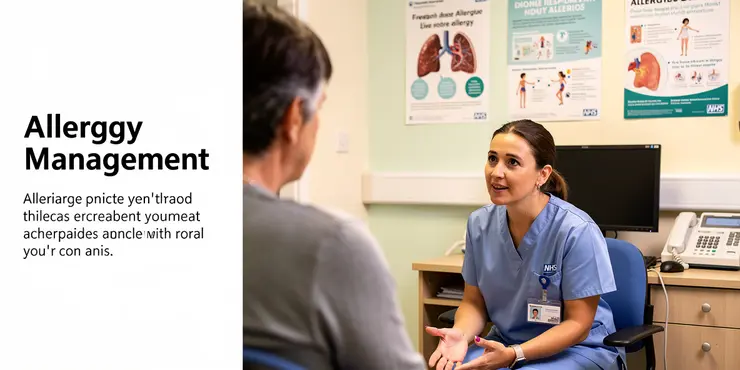
Find Help
More Items From Ergsy search
-
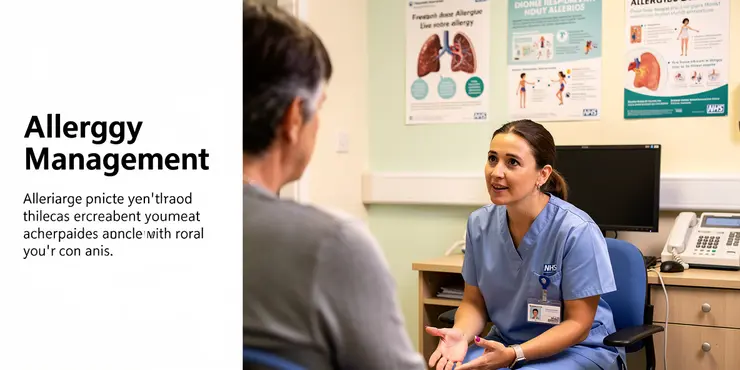
Is there a link between hay fever and asthma?
Relevance: 100%
-

Hay fever advice | NHS
Relevance: 62%
-

What is hay fever?
Relevance: 62%
-

Do masks help with hay fever?
Relevance: 60%
-

Can hay fever symptoms mimic other conditions?
Relevance: 59%
-
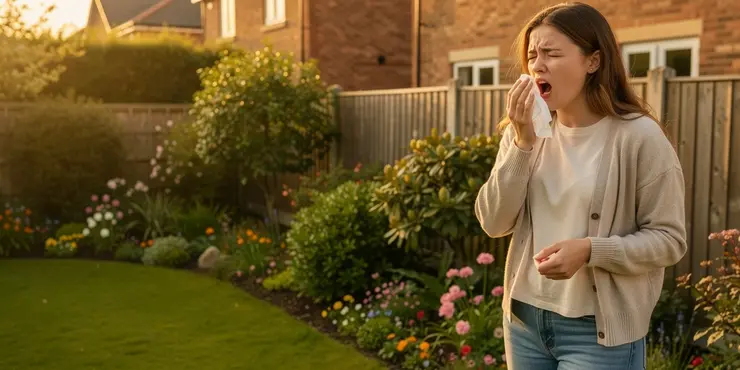
Experts Warn of Rising Hay Fever Cases as Pollen Counts Surge
Relevance: 59%
-
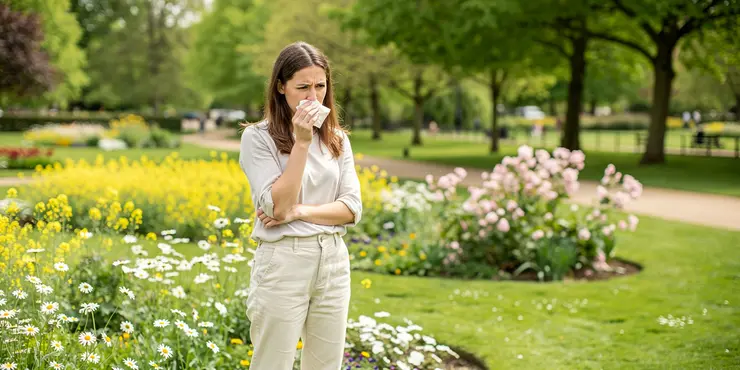
Are some people more prone to hay fever?
Relevance: 58%
-
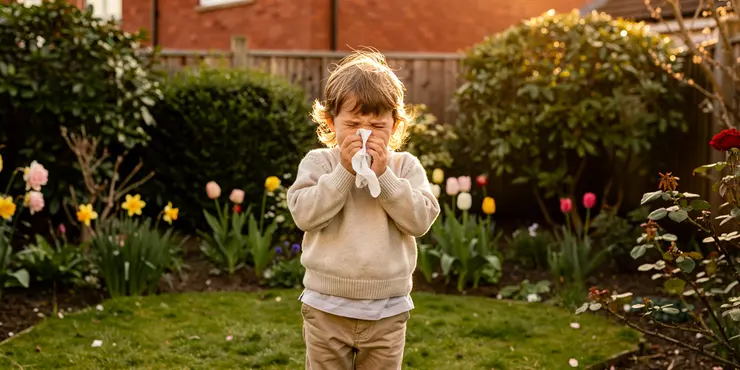
Can children develop hay fever?
Relevance: 57%
-

Do pets contribute to hay fever?
Relevance: 57%
-

Why are experts warning of rising hay fever cases?
Relevance: 57%
-

Can hay fever be prevented?
Relevance: 56%
-

How does pollen affect people with hay fever?
Relevance: 56%
-

What are the common symptoms of hay fever?
Relevance: 55%
-

Is hay fever more common in urban areas?
Relevance: 55%
-

Can hay fever occur year-round?
Relevance: 54%
-

Can diet influence hay fever symptoms?
Relevance: 53%
-

Antihistamines how they work with hay fever
Relevance: 53%
-

Do all plants produce pollen that causes hay fever?
Relevance: 52%
-

Self care - hay fever itchy eyes
Relevance: 51%
-

Can mosquito screens help reduce hay fever symptoms?
Relevance: 46%
-

Are there any treatments for hay fever?
Relevance: 41%
-

Rise in Childhood Asthma Linked to Air Pollution in Urban Areas
Relevance: 38%
-

What causes asthma?
Relevance: 37%
-

Are there different types of asthma?
Relevance: 37%
-

What is Asthma?
Relevance: 37%
-

UK Study Links Poor Air Quality to Increased Asthma Cases in Urban Areas
Relevance: 36%
-

How long does a typical hay fever season last?
Relevance: 35%
-

Can diet affect asthma?
Relevance: 32%
-

Can stress cause asthma symptoms?
Relevance: 31%
-

What triggers asthma attacks?
Relevance: 29%
-

Can asthma be cured?
Relevance: 29%
-

Can asthma be fatal?
Relevance: 29%
-

How is asthma treated?
Relevance: 29%
-

Is asthma a serious condition?
Relevance: 29%
-

How is asthma diagnosed?
Relevance: 29%
-

What is an asthma action plan?
Relevance: 28%
-

An Asthma Explainer with Dr Katherine Hickman
Relevance: 28%
-

What are the common symptoms of asthma?
Relevance: 28%
-

Are inhalers the only treatment for asthma?
Relevance: 28%
-

Can children outgrow asthma?
Relevance: 28%
Understanding Hay Fever and Asthma
Hay fever, known medically as allergic rhinitis, and asthma are both common allergic conditions that affect many people in the UK. While they are distinct conditions, there is a significant link between the two. Hay fever is an allergic reaction to airborne substances such as pollen, which causes inflammation in the nose. Asthma, on the other hand, affects the airways to the lungs, causing symptoms such as coughing, wheezing, and shortness of breath.
The Link Between Hay Fever and Asthma
The connection between hay fever and asthma is well-documented. Individuals with hay fever are more likely to develop asthma, and vice versa. This is primarily because both conditions are triggered by a similar allergic response. When someone with an allergic disposition encounters allergens like pollen, their immune system overreacts. This can lead to inflammation in both the nasal passages and the airways of the lungs. Thus, it's common for people suffering from hay fever to experience asthma symptoms, particularly during seasons of high pollen counts.
Shared Triggers and Symptoms
In both hay fever and asthma, common triggers include pollen, dust mites, pet dander, and moulds. Many people with hay fever find that their asthma symptoms worsen during the pollen season. This is due to the heightened immune response that affects both the upper and lower respiratory tracts. Symptoms such as sneezing, runny or blocked nose, and itchy eyes of hay fever can coincide with asthma symptoms like coughing and wheezing, creating discomfort and difficulty in breathing.
Managing Hay Fever and Asthma Together
For those affected by both conditions, managing hay fever can significantly alleviate asthma symptoms. It is important to follow an integrated approach in treatment. Antihistamines and nasal corticosteroids can be effective in controlling hay fever symptoms, while asthma can be managed with inhalers that reduce inflammation and open the airways. Many healthcare providers recommend taking these medications as part of a comprehensive treatment plan.
Consultation and Prevention
People experiencing symptoms of hay fever and asthma together should consult with their healthcare provider to obtain a tailored treatment plan. Preventative measures such as monitoring pollen forecasts and keeping windows closed during high pollen counts can also help reduce exposure to allergens. For individuals with both hay fever and asthma, regular check-ups and asthma reviews are vital to monitor their condition and adjust treatment as needed. The link between these two conditions underscores the importance of addressing allergic responses that affect overall respiratory health.
What Are Hay Fever and Asthma?
Hay fever and asthma are allergies. Many people in the UK have them. Hay fever makes your nose sore because of pollen in the air. Asthma affects your breathing by making it hard to breathe and causing coughing and wheezing.
How Are Hay Fever and Asthma Connected?
Hay fever and asthma often happen together. If you have hay fever, you might get asthma too. This is because both are caused by allergies. When your body doesn't like things like pollen, it overreacts. This can make your nose and lungs swollen. So, if you have hay fever, you might notice asthma symptoms, especially when there is a lot of pollen.
What Triggers and Symptoms Do They Share?
Things like pollen, dust, pets, and mould can trigger both hay fever and asthma. If you have hay fever, your asthma might get worse when pollen is high. This is because your body is trying to fight off these things. Hay fever makes you sneeze and have a runny nose and itchy eyes. Asthma makes you cough and wheeze, making it hard to breathe.
How to Manage Hay Fever and Asthma?
If you have both hay fever and asthma, treating hay fever can help your asthma. Medicines called antihistamines can help hay fever. For asthma, inhalers are used to help you breathe better. Doctors say using both can help you feel better.
Talk to Your Doctor
If you have symptoms of hay fever and asthma, talk to your doctor. They can help you with a plan. You can also keep track of pollen levels and close your windows when pollen is high. Regular doctor visits are important to check how you are doing and change your treatment if needed. It is important to take care of your allergies to keep your lungs healthy.
Frequently Asked Questions
Is there a link between hay fever and asthma?
Yes, there is a link between hay fever and asthma, as both are allergic conditions that can have overlapping symptoms and triggers.
How does hay fever affect asthma?
Hay fever can exacerbate asthma symptoms by causing inflammation in the airways and increased sensitivity to allergens.
Can treating hay fever help with asthma symptoms?
Yes, effectively managing hay fever can help improve asthma control by reducing overall allergic inflammation.
Are the triggers for hay fever and asthma the same?
Hay fever and asthma can share some common triggers such as pollen, dust mites, and pet dander, but they may also have unique triggers.
Is it common to have both hay fever and asthma?
Yes, many people experience both hay fever and asthma, and having one can increase the likelihood of having the other.
What percentage of people with asthma also have hay fever?
It is estimated that around 60-80% of people with asthma also suffer from allergic rhinitis or hay fever.
Can hay fever cause asthma attacks?
Hay fever can trigger asthma attacks in susceptible individuals due to increased airway inflammation.
Should people with asthma be concerned about hay fever seasons?
Yes, people with asthma should pay attention to hay fever seasons as increased pollen can worsen asthma symptoms.
How can someone with asthma and hay fever manage their symptoms?
A combination of avoiding triggers, using medications like antihistamines and inhalers, and following an asthma action plan can help manage symptoms.
What treatments are available for someone with both hay fever and asthma?
Treatment options include inhaled corticosteroids for asthma, oral antihistamines, nasal sprays, and allergy immunotherapy.
Can hay fever be a risk factor for developing asthma?
Yes, having hay fever can be a risk factor for developing asthma, particularly if allergic rhinitis is not well-managed.
Are there any lifestyle changes that can help reduce the impact of hay fever and asthma?
Lifestyle changes such as reducing exposure to allergens, using air filters, and maintaining a healthy diet and weight can help manage symptoms.
Is there a genetic component linking hay fever and asthma?
Yes, both conditions can run in families, suggesting a genetic component to their development.
Can stress exacerbate both hay fever and asthma symptoms?
Yes, stress can worsen symptoms of both hay fever and asthma by triggering inflammatory responses.
Are children with hay fever at higher risk for asthma?
Children with allergic rhinitis are at higher risk for developing asthma later in life.
Can exercise-induced asthma be affected by hay fever?
Yes, exercise-induced asthma symptoms may be worsened during hay fever seasons due to increased allergens.
How important is it to diagnose and treat hay fever in asthma patients?
Diagnosing and treating hay fever in asthma patients is crucial to prevent complications and improve overall quality of life.
Can air filtration systems help with both hay fever and asthma?
Yes, using air filtration systems can reduce indoor allergens and help manage symptoms of both conditions.
What role do allergens play in the connection between hay fever and asthma?
Allergens are a key factor linking hay fever and asthma, as they trigger immune responses that lead to symptoms in both conditions.
Can medications for hay fever interfere with asthma medications?
Generally, medications for hay fever do not interfere with asthma medications, but it is important to consult a doctor for a coordinated treatment plan.
Are hay fever and asthma connected?
Yes, hay fever and asthma are connected. They are both allergies. This means they can make you feel bad in similar ways and be caused by the same things.
How does hay fever affect asthma?
Hay fever can make asthma worse. If you have hay fever, your nose might be itchy and runny. You might sneeze a lot. This can make it harder to breathe if you have asthma.
If you have both hay fever and asthma, tell your doctor. They can help you feel better.
Here are some tips to help: Use a tissue or wear a mask when you sneeze or blow your nose. Stay indoors when there is a lot of pollen outside. Pollen can make hay fever worse.
Ask someone to help you read big words. Use pictures or videos to understand better.
Hay fever can make asthma worse. It makes your airways swell and more sensitive to things you are allergic to.
Can fixing hay fever help with asthma?
If you have hay fever, you might feel stuffy or sneezy. People with asthma can feel wheezy or out of breath.
Fixing hay fever can sometimes help with asthma too. When your nose feels better, you might breathe easier.
Try these tips to help:
- Use nose spray or take allergy pills.
- Stay inside when there's a lot of pollen outside.
- Wash your hands and face if you’ve been outside.
If you’re not sure what to do, ask a doctor. They can help you find the best way to feel better.
Yes, controlling hay fever can help with asthma. It does this by lowering the body's allergic reactions.
Do the same things cause hay fever and asthma?
Hay fever and asthma are both health problems. They can happen because of some of the same things, like pollen from flowers, tiny bugs called dust mites, and fur from pets. But sometimes, different things can cause them too.
Can you have both hay fever and asthma at the same time?
Yes, lots of people have hay fever and asthma. If you have one, you might get the other too.
How many people with asthma also get hay fever?
We want to know how many out of every 100 people with asthma also have hay fever.
Here are some tips to help you understand:
- Think of 100 people who have asthma.
- Imagine how many of them also sneeze and get itchy eyes from hay fever.
You might find it helpful to use a calculator or ask someone to help you count.
Lots of people with asthma also get hay fever. Doctors think this is true for about 6 or 8 out of every 10 people with asthma.
Can hay fever make asthma worse?
Hay fever can make asthma worse for some people. This is because it can cause more swelling in the airways.
Is hay fever a problem for people with asthma?
If you have asthma, you might find it harder to breathe when there is a lot of pollen in the air. Pollen comes from flowers, trees, and grass.
During hay fever season, pollen can make asthma worse. You might cough, wheeze, or feel tight in your chest.
Here are some things you can do during hay fever season:
- Stay inside when there is a lot of pollen. Check the pollen count on weather websites or apps.
- Keep windows and doors closed to stop pollen from coming in.
- If you go outside, wear sunglasses to protect your eyes and a mask to help you breathe.
- Take medicines for asthma and hay fever if your doctor or nurse tells you to.
It is important to talk to your doctor or nurse about how to manage your asthma during hay fever season.
How can you feel better if you have asthma and hay fever?
If you have asthma and hay fever, here are some ways to feel better:
- Take your medicine as the doctor says.
- Stay away from things that make you sneeze or wheeze, like pollen or dust.
- Try using a humidifier to keep the air moist.
- Wash hands and face after playing outside.
- Ask a grown-up to help you with a plan for when you feel bad.
Using a reminder app can help you take your medicine on time.
To help you feel better, try staying away from things that make you sick. You can also take special medicine like antihistamines or use an inhaler. Having a plan for when your asthma makes you feel bad can also help.
What can help someone with hay fever and asthma?
If you have both hay fever and asthma, you can use some things to feel better.
- Medicines: You can take special medicine to help with breathing and sneezing.
- Nasal sprays: These sprays can help stop your nose from feeling itchy and runny.
- Inhalers: Using an inhaler can help you breathe easier if you have asthma.
- Stay indoors: Try to stay inside when there is a lot of pollen outside.
- Close windows: Keep your windows shut to stop pollen from coming inside.
Ask a doctor for help if you need more information.
If you have asthma or allergies, doctors can help you feel better with medicine. Here are some things they might use:
- Special medicine you breathe in to help your lungs. This is for asthma.
- Pills you take to stop sneezing and itching. These are called antihistamines. They help with allergies.
- Sprays you use in your nose to help you breathe better. These are for allergies too.
- A special treatment to help your body get used to things that make you have allergies. This helps them not bother you so much.
Talking with a doctor can help you decide which is best for you. Tools like a calendar can remind you when to take your medicine, and writing notes can help you remember how you feel each day.
Can having hay fever make you more likely to get asthma?
Yes, having hay fever can make it more likely for someone to get asthma. It is important to take care of hay fever so it doesn't get worse.
Can changing how I live help with hay fever and asthma?
Yes, there are ways to feel better:
- Stay Inside When Pollen Is High: Check the weather report for pollen levels. Stay inside when they're high.
- Close Windows: Keep your windows shut to stop pollen coming inside.
- Clean Regularly: Dust and vacuum often to keep your home free of pollen.
- Wash Hands and Face: After being outside, wash to remove pollen.
- Wear Sunglasses: This can help keep pollen out of your eyes.
Try to do these things to help with hay fever and asthma. It's okay to ask someone for help if you find it hard. You can also use helpful apps or tools on your phone. They can remind you what to do.
You can feel better by doing some simple things:
- Stay away from things that make you sneeze or feel sick, like dust or pollen.
- Use air filters to keep the air clean at home.
- Eat healthy foods and try to stay at a good weight.
These things can help you feel good and keep the symptoms away.
Are hay fever and asthma linked by genes?
Yes, both of these conditions can be found in families. This means they might be passed down from parents to children through genes.
Can stress make hay fever and asthma symptoms worse?
Yes, feeling stressed can make hay fever and asthma worse. Stress causes your body to react and that can make you feel more sick.
Do kids with hay fever have a bigger chance of getting asthma?
Children who have allergies and sneezing have a bigger chance of getting asthma when they grow up.
Does hay fever make exercise asthma worse?
Yes, exercise can make asthma worse when there is a lot of pollen in the air. This is because there are more things in the air that can cause allergies.
Why is it important to find and treat hay fever in people with asthma?
It is important to find out if someone with asthma also has hay fever. This helps stop problems and makes them feel better.
Can air filters help with hay fever and asthma?
Do air filters help when you sneeze or have trouble breathing because of hay fever or asthma?
Simple language is important. Try using read-aloud tools to help understand. Pictures or videos can also be helpful.
Yes, using air filters can help make the air inside cleaner. This can help people feel better if they have allergies or asthma.
How do things that make you sneeze also affect asthma?
Some people sneeze or have itchy eyes because of tiny things like pollen or dust, called allergens. These allergens can also make it hard to breathe if you have asthma.
When allergens bother your body, it can make your nose run and your chest feel tight.
To help manage these feelings, you can use:
- Nasal sprays to help with a runny nose.
- Inhalers to make breathing easier if you have asthma.
Things we are allergic to, called allergens, can make us sneeze and have itchy eyes. They can also make it hard to breathe if you have asthma. Allergens make our bodies react in a way that causes these symptoms.
Can hay fever medicine affect asthma medicine?
Medicines for hay fever usually work fine with asthma medicines. But it is good to ask a doctor for help. The doctor can give you a good plan for using both medicines together.
Useful Links
This website offers general information and is not a substitute for professional advice.
Always seek guidance from qualified professionals.
If you have any medical concerns or need urgent help, contact a healthcare professional or emergency services immediately.
Some of this content was generated with AI assistance. We’ve done our best to keep it accurate, helpful, and human-friendly.
- Ergsy carfully checks the information in the videos we provide here.
- Videos shown by Youtube after a video has completed, have NOT been reviewed by ERGSY.
- To view, click the arrow in centre of video.
- Most of the videos you find here will have subtitles and/or closed captions available.
- You may need to turn these on, and choose your preferred language.
- Go to the video you'd like to watch.
- If closed captions (CC) are available, settings will be visible on the bottom right of the video player.
- To turn on Captions, click settings .
- To turn off Captions, click settings again.
More Items From Ergsy search
-

Is there a link between hay fever and asthma?
Relevance: 100%
-

Hay fever advice | NHS
Relevance: 62%
-

What is hay fever?
Relevance: 62%
-

Do masks help with hay fever?
Relevance: 60%
-

Can hay fever symptoms mimic other conditions?
Relevance: 59%
-

Experts Warn of Rising Hay Fever Cases as Pollen Counts Surge
Relevance: 59%
-

Are some people more prone to hay fever?
Relevance: 58%
-

Can children develop hay fever?
Relevance: 57%
-

Do pets contribute to hay fever?
Relevance: 57%
-

Why are experts warning of rising hay fever cases?
Relevance: 57%
-

Can hay fever be prevented?
Relevance: 56%
-

How does pollen affect people with hay fever?
Relevance: 56%
-

What are the common symptoms of hay fever?
Relevance: 55%
-

Is hay fever more common in urban areas?
Relevance: 55%
-

Can hay fever occur year-round?
Relevance: 54%
-

Can diet influence hay fever symptoms?
Relevance: 53%
-

Antihistamines how they work with hay fever
Relevance: 53%
-

Do all plants produce pollen that causes hay fever?
Relevance: 52%
-

Self care - hay fever itchy eyes
Relevance: 51%
-

Can mosquito screens help reduce hay fever symptoms?
Relevance: 46%
-

Are there any treatments for hay fever?
Relevance: 41%
-

Rise in Childhood Asthma Linked to Air Pollution in Urban Areas
Relevance: 38%
-

What causes asthma?
Relevance: 37%
-

Are there different types of asthma?
Relevance: 37%
-

What is Asthma?
Relevance: 37%
-

UK Study Links Poor Air Quality to Increased Asthma Cases in Urban Areas
Relevance: 36%
-

How long does a typical hay fever season last?
Relevance: 35%
-

Can diet affect asthma?
Relevance: 32%
-

Can stress cause asthma symptoms?
Relevance: 31%
-

What triggers asthma attacks?
Relevance: 29%
-

Can asthma be cured?
Relevance: 29%
-

Can asthma be fatal?
Relevance: 29%
-

How is asthma treated?
Relevance: 29%
-

Is asthma a serious condition?
Relevance: 29%
-

How is asthma diagnosed?
Relevance: 29%
-

What is an asthma action plan?
Relevance: 28%
-

An Asthma Explainer with Dr Katherine Hickman
Relevance: 28%
-

What are the common symptoms of asthma?
Relevance: 28%
-

Are inhalers the only treatment for asthma?
Relevance: 28%
-

Can children outgrow asthma?
Relevance: 28%


